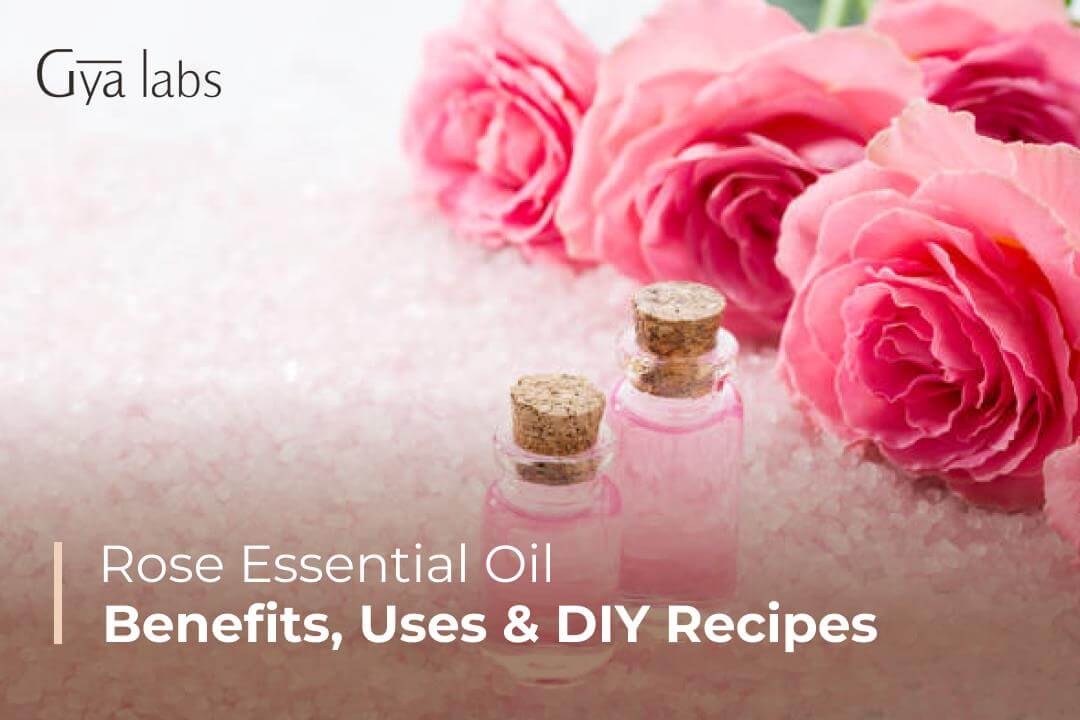Rose holds a very place in our hearts, especially if we are in love. Many poets and writers have depicted the rose as one of the symbols of love. So, I believe almost everyone feels loved when someone gives us a rose; at least, I can say this for myself. Well, apart from being the symbol of love, the rose holds immense benefits for us, and I am pretty sure very few people know this.
Need not worry!! This article is a comprehensive guide on rose essential oil that holds all the benefits and properties of rose flowers. Rose essential oil is extracted from the petals of rose flowers. Using a few drops of oil on your face can help deal with many skin troubles.
By reading this article, you will come across many health, skin, and hair-related benefits of rose oil. It also covers several uses of rose oil and also suggests some DIY recipes that you can try in the comfort of your home using rose oil.
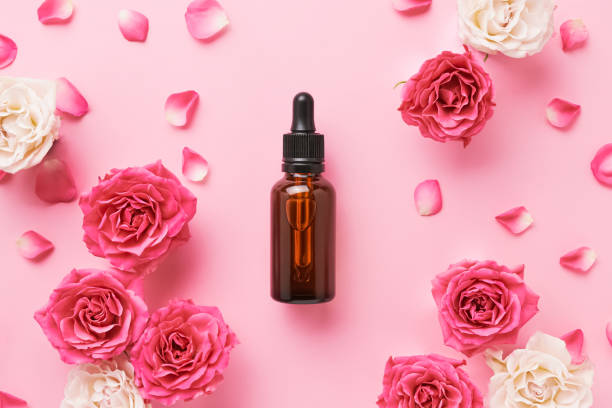
Rose oil has an enchanting fragrance that makes it appropriate for use in aromatherapy. Also, it has many therapeutic and medicinal benefits that one can enjoy using a bottle of rose oil.
Continue to learn more about rose essential oil, its benefits and uses, and other important aspects.
| Botanical Name | Rosa damascena |
| Plant Family | Rosaceae |
| Plant Part Used | Flowers (Petals) |
| Color | Rose Otto oil is light yellow in color, and Rose Absolute is deep red in color |
| Consistency | Rose Otto is thin consistency, and Rose Absolute is thick in consistency |
| Perfumery Note | Middle |
| Strength of Initial Aroma | Strong |
| Aromatic Description | Floral and sweet scent |
| Major Constituents | Citronellol, Geranoil, Alkenes & Alkanese, Nerol, Methyleugenol, Linalool, Citronellyl Acetate, Ethanol, 2-Phenylethano |
What are the Benefits of Rose Essential Oil?
There are several health benefits of rose oil, including skin-related benefits and hair-related benefits of rose oil. Read below to know more in detail about these different benefits of rose essential oils
Health Benefits of Rose Oil
Following are some of the health effects of rose essential oil:
1. Relieves Stress and Anxiety
The soothing aroma of rose essential oil has calming effects on the mind and body, helping to reduce stress and anxiety (1). It promotes relaxation and uplifts the mood, contributing to overall mental well-being. Diffusing this oil instantly energizes your mood. It is a great oil to diffuse after a hectic day. This is one of the most commonly used oils in aromatherapy. You can also diffuse a few drops of rose oil during your yoga or meditation sessions to promote calmness and relaxation.

Also, must read about: Best Candels For Meditation
2. Supports Digestive Health
One of the effects of rose oil is that it helps support your stomach health. Rose oil possesses carminative properties that aid in relieving digestive issues such as bloating, indigestion, and stomach cramps. It can also help regulate bowel movements. It has anti-inflammatory, antibacterial, and antimicrobial properties that help in dealing with many different stomach-related issues.
3. Boosts Immune System
The antimicrobial and antioxidant properties of rose essential oil support a healthy immune system. It helps combat pathogens and strengthens the body’s natural defense mechanisms.
4. Eases Headaches
Inhalation or topical application of rose essential oil can help alleviate headaches and migraines. Its calming and analgesic properties provide soothing relief.
5. Supports Emotional Well-being
Rose essential oil also supports your emotional health and well-being. Rose is known as the “queen of flowers” as it is associated with many different emotions like love, compassion, and harmony. The fragrance of rose oil has the ability to uplift your spirits; it promotes a feeling of joy within you and thus is believed to support emotional well-being. You can diffuse this essential oil to create a romantic and calming ambiance, as it also contains aphrodisiac properties.
6. Eases Menstrual Discomfort
High quality rose oil, opposite to rosehip oil or rosehip seed oil, contains antispasmodic properties that help in relieving menstrual discomforts. It has properties that help in releasing menstrual cramps and also fight symptoms of PMS. You can diffuse a few drops of rose essential oil for relief during menstruation. Or you can also dilute it with any other carrier oil and use it as a tummy rub and rub your lower abdomen in a circular motion using this oil to get relief from menstrual cramps.
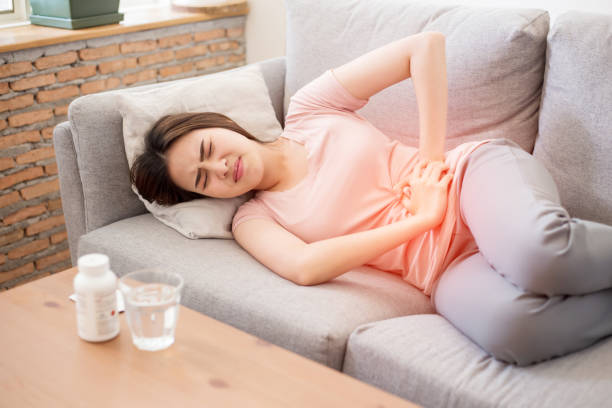
Skin Benefits of Rose Oil
There are many surprising benefits of rose essential oil for skin that are explored below in detail:
1. Moisturizes and Hydrates
Rose essential oil is a natural emollient that helps moisturize and hydrate the skin. It locks in moisture for a longer period of time, making it an excellent choice for dry or dehydrated skin.

2. Soothes Irritation and Redness
The anti-inflammatory properties of rose essential oil help soothe skin irritations, including redness, itching, and inflammation. It is beneficial for sensitive and reactive skin types.
3. Promotes Youthful Complexion
Rose essential oil is rich in antioxidants that combat free radicals, preventing premature aging. It helps reduce the appearance of fine lines, wrinkles, and age spots, promoting a youthful complexion. Rose oil can be used to even tone your skin and improve your skin texture (2).
4. Treats Acne and Breakouts
Rose essential oil possesses antibacterial properties that can help combat acne-causing bacteria. It also helps regulate sebum production, preventing clogged pores and reducing breakouts. It controls excess oil production on the skin, which acts as a bed for bacterial and fungal growth, which leads to breakouts and acne.
*Note: Rose oil has many skin benefits for the skin when used with proper care and attention. Mixing a few drops of essential oil with any carrier oil is necessary before applying an essential oil to your skin to reduce its concentration.
Hair Benefits of Rose Oil
Rose essential oil has been used as a part of hair care for ages. Following are some of the rose essential oil benefits for your hair.
1. Stimulates Hair Growth
Rose oil stimulates hair growth. Massaging with rose oil can enhance blood circulation to the scalp, promoting hair growth. It strengthens the hair follicles, strengthens hair, and reduces hair fall, leading to thicker and healthier hair.

2. Conditions and Softens
Incorporating rose essential oil into hair care routines helps condition and soften the hair. It adds natural shine, tames frizz and improves overall hair texture.
3. Soothes Scalp Irritation
The anti-inflammatory and antioxidant properties of rose oil benefits your hair and scalp. It can soothe scalp irritations like itchiness and dryness. It helps maintain a healthy scalp environment for optimal hair growth. It can also help get rid of dandruff.

What are Some of the Uses of Rose Essential Oil?
You can use the oil in many different ways. Following are some of the effective uses of rose essential oil.
1. Aromatherapy
This is one of the most common uses of rose oil. The enchanting fragrance of rose essential oil is widely used in aromatherapy practices. It promotes relaxation, reduces stress, and creates a calming atmosphere. You can use an electric diffuser for this purpose. Diffusing rose essential oil will promote relaxation and calmness. Aromatherapy with rose also supports emotional and physical well-being. Diffusing essential oils creates a tranquil environment.

2. Perfumery
Rose essential oil is a prized ingredient in the creation of perfumes and fragrances. Its floral and captivating scent adds depth and allure to various personal care products. This is a common oil that is used in the perfumery industry. You can also make your one perfume at home. Mix a few drops of rose oil with a water-based solution, carrier oil, and alcohol, and there you go, your own DIY rose spray.
3. Bathing Rituals
Rose oil may add a feather to your bathing ritual. Adding a few drops of rose essential oil to your bathwater can enhance relaxation. You can enjoy all the properties of rose oil. Add a few drops of rose oil to your bathtub; if you want, you can also add Epsom salt in your bath, immerse yourself in the water, and enjoy the qualities of rose oil and a relaxing bath.
4. Skincare
This is another common use of rose oil. Essential oils are gaining wide relevance in skincare mainly because of their medicinal and therapeutic properties. You can dilute a few drops of rose oil with any carrier oil such as coconut oil, jojoba oil, sweet almond oil, apricot oil, avocado oil, argan oil, castor oil, sesame seed oil, etc., and apply topically on your skin to eliminate skin troubles. You can also mix rose oil with creams, lotions, toners, moisturizers, serums, etc., and use it on your skin to improve the overall health of your skin. Rose oil helps rejuvenate your skin from within and enhances your natural complexion, giving you radiant and glowing skin.
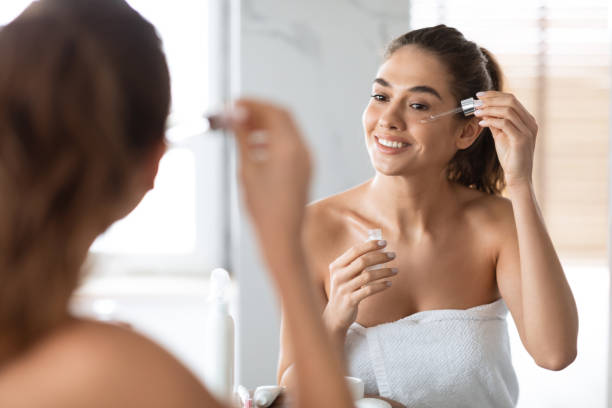
5. Hair Care
You can add a few drops of rose oil to your shampoo and conditioner and change your hair care game. Rose oil has nourishing properties that add a natural shine to hair and makes hair soft and smooth. It locks moisture within the scalp and helps you get rid of dry scalp and dry scalp-related issues like itchiness, dandruff, etc. Rose oil is also believed to stimulate hair growth. It adds volume to your hair and makes your hair look fuller.
6. Massage
Massaging is one of the most common uses of essential oils. Rose essential oil is also a great massaging oil. Rose oil can be used as a massage rub to get relief from inflammation or to enjoy the benefits of this oil. It can be used to massage and relax muscle tension and sore muscles. This is a great oil for post-workout muscle relaxation. This is a great oil to improve your overall massage experience with its soothing and calming fragrance.
7. Inhalation
Inhaling is another use of essential oil. You can take a whiff of rose oil directly from its bottle to enjoy its fragrance or utilize its therapeutic and medicinal properties. Inhaled rose oil can help you relax and reduce your stress, anxiety, and tension. Also, it can be inhaled to boost your immunity or to treat seasonal allergies.
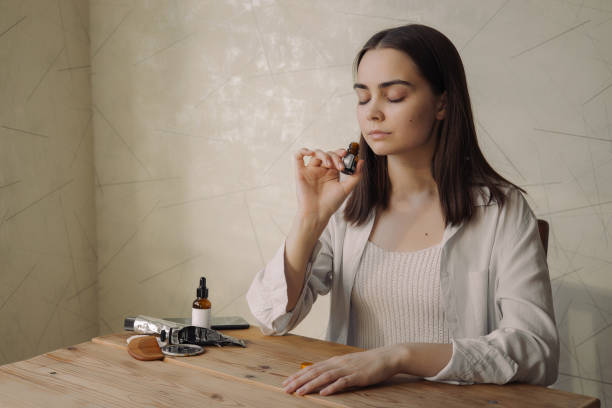
8. Culinary Delights
Rose oil can be used in culinary practices to add a delicate and floral touch to different dishes and beverages. Though, always make sure to use food-grade rose essential oil when using it for consumption. Also, keep in check the quantity to make sure that you do not suffer from any negative repercussions.
Difference Between Rose Oil and Rosehip Seed Oil
| Aspect | Rose Oil | Rosehip Oil |
|---|---|---|
| Source | Extracted from rose flowers | Extracted from the seeds of rosehip fruit |
| Aroma | Strong, floral fragrance | Mild, earthy scent |
| Composition | Contains essential oil compounds | Rich in fatty acids, vitamins, and antioxidants |
| Skincare Benefits | Nourishes and moisturizes skin | Helps reduce scars, wrinkles, and hyperpigmentation |
| Anti-Aging Effects | Helps improve skin elasticity | Supports collagen production and reduces signs of aging |
| Healing Properties | Soothes skin irritations | Assists in healing scars and wounds |
| Hair Care | Promotes healthy hair growth | Conditions and adds shine to hair |
| Aromatherapy Uses | Uplifts mood and reduces stress | Relieves anxiety and promotes relaxation |
| Absorption | Absorbs quickly into the skin | Absorbs easily without leaving a greasy residue |
| Shelf Life | Relatively short shelf life | Longer shelf life compared to rose oil |
DIY Recipes Using Rose Essential Oil
Essential oils are one of the best ingredients that you can use in your different DIY recipes to add a fragrance touch to your DIYs. Following are some of the essential oil blend DIY recipes that you can try using rose essential oil.
Soothing Rose Bath Salts
Ingredients:
- 1 cup Epsom salt
- 1/4 cup dried rose petals
- 10 drops of the oil of rose
Instructions:
- In a bowl, combine the Epsom salt and dried rose petals.
- Add the rose essential oil and mix well.
- Store the bath salts in a sealed container.
- Add a few tablespoons of the mixture to your bath for a relaxing and aromatic experience.
Rejuvenating Rose Face Mask
Ingredients:
- 2 tablespoons rose clay
- 1 tablespoon rosewater
- 4 drops of essential oil of rose
Instructions:
- In a small bowl, combine the rose clay and rosewater to form a smooth paste.
- Add the rose essential oil and mix well.
- Apply the face mask made with rose oil to your face to clean the skin and leave it on for 10-15 minutes.
- Rinse off with warm water and enjoy the refreshed and revitalized sensation.
Uplifting Rose Room Spray
Ingredients:
- 1/2 cup distilled water
- 2 tablespoons witch hazel
- 15 drops of rose essential oil
Instructions:
- In a spray bottle, combine the distilled water and witch hazel.
- Add the rose essential oil and shake well to blend.
- Use the spray to freshen up your living spaces with the enchanting aroma of roses.
Precautions and Safety
Essential oils are natural products as they are extracted from different parts of plants and thus are safe to use. Though, there are certain precautions that need to be undertaken in order to ensure the safe use of essential oils. Following are some of the measures that should be adopted while using essential oils:
- Dilution: There are many rose oil skin benefits when used topically. But, essential oils in their undiluted form are highly concentrated, which can cause skin irritation or some sort of allergic reaction. Always use diluted rose oil for the skin in order to avoid skin irritation or any allergic reactions. Dilute rose essential oil with a suitable carrier oil before applying it to the skin. A general rule of thumb is to use a 2-3% dilution ratio. You can add a few drops of rose oil to a face serum as well and then apply it to your skin. Also, it is suggested to use essential oils in limit. Using a small amount of diluted rose oil goes a long way, so avoid using too much oil, as you will end up wasting the oil for no good.
- Patch Test: Some people might be allergic to essential oils, and in order to find out whether you are allergic or not, it is suggested to take a patch test before applying rose oil on your face or skin. Before using rose essential oil topically, perform a patch test on a small area of skin to check for any allergic reactions or sensitivities.
- Pregnancy and Nursing: It is usually advised to avoid using any essential oil if you are pregnant or breastfeeding. If you still want to do so, then consult with a healthcare professional before using rose essential oil during pregnancy or while nursing.
- Photosensitivity: Rose essential oil may increase the skin’s sensitivity to sunlight. Avoid sun exposure for at least 12 hours after applying it topically. Always use sunscreen when you are going out in the sun to protect your skin from harmful rays.
- Quality: Choose high-quality, pure rose oil from reputable sources to ensure its effectiveness and safety.
Conclusion
Rose essential oil, with its captivating fragrance and remarkable benefits, has secured its place as a cherished ingredient in various wellness practices. Rose oil is very expensive as one uses 1000s of rose petals to produce a 5 ml bottle of rose oil. From skincare to aromatherapy, this precious oil offers a myriad of uses and can contribute to your overall well-being.
By understanding its benefits, exploring versatile applications, and following necessary precautions, you can fully enjoy the wonders of pure rose essential oil in your daily life. You can add the benefits of rose essential oil to a face mask or face serum by diluting the oil.
Frequently Asked Questions
What is rose essential oil used for?
Rose essential oil is used for various purposes due to its aromatic and therapeutic properties. It is commonly used in aromatherapy to promote relaxation, reduce stress, and uplift mood. In skincare, rose essential oil is known for its moisturising and soothing effects on the skin. It is also used in perfumes, bath products, and massage oils.
What are the benefits of rose essential oil for skin and hair?
Rose essential oil offers several benefits for the skin and hair. For the skin, it can help moisturise dry skin, soothe irritation, and reduce redness. It is also believed to have anti-aging properties, promoting a more youthful appearance by improving skin elasticity and reducing the appearance of wrinkles. In hair care, rose essential oil can help nourish and condition the hair, adding shine and promoting healthy hair growth.
Does rose oil make skin glow?
Yes, rose oil is often associated with enhancing the skin’s natural glow. It helps moisturise and nourish the skin, improving its overall appearance. The hydrating properties of rose oil can give the skin a radiant and healthy glow, making it look more vibrant and youthful.
Is rose good for skin whitening?
While rose oil can contribute to improving the complexion and overall appearance of the skin, it is not specifically known for its skin whitening properties. Rose oil helps moisturise, soothe, and rejuvenate the skin, but if you are looking for skin whitening effects, it is advisable to explore other skincare options specifically targeted for that purpose.
Source:
- Influence of molecular distillation on antioxidant and antimicrobial activities of rose essential oils https://www.sciencedirect.com/science/article/abs/pii/S0023643818311095
- Chapter Six – Pharmaceutical based cosmetic serums https://www.sciencedirect.com/science/article/abs/pii/S1871512522000206
